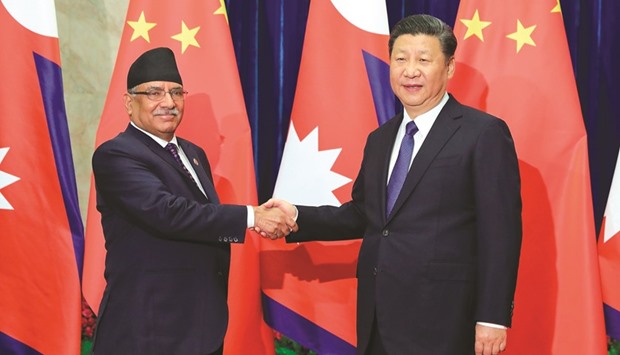Nepal should become involved in a Chinese-led trade and infrastructure network dubbed “One Belt, One Road” that aims to connect countries in Eurasia and Africa in a modern-day Silk Road, Chinese President Xi Jinping said yesterday.
Xi spoke in Beijing during a visit by Nepalese Prime Minister Pushpa Kamal Dahal, who came to power in August and is eager to attract Chinese
investment and trade.
“China and Nepal should take building One Belt, One Road together as an opportunity to make solid progress on interconnection, free trade agreements, agriculture, production, energy, post-disaster reconstruction and other areas of co-operation,” Xi said, according to state broadcaster CCTV.
In a speech at the Beijing Foreign Studies University on Sunday, Dahal said Nepal and China should build upon the legacy of the ancient Silk Road to “create a modern success story.”
In his statement to Xi, Dahal thanked China for its support during the nation’s post-disaster reconstruction efforts and said Nepal looks forward to expanding cooperation with China in areas such as trade, investment, infrastructure and tourism.
He said Nepal is committed to the “One China” policy, which requires countries that seek diplomatic relations with China to break official relations with Taiwan.
Dahal arrived in China on Thursday and met Chinese Vice Premier Zhang Gaoli on Friday.
He discussed plans to construct railways, fuel storage facilities and transmission lines along the border with Tibet in northern Nepal, Dahal’s
secretariat said.
“Our location among the largest economies of Asia brings great prospects of establishing Nepal as a trade hub; a vital link in the global value chain,” Dahal told a gathering of business and government leaders on Saturday.
China has sought to increase its influence in Nepal by signing trade and transit agreements and investing in hydropower plants and roads after the Himalayan nation’s ties with India, its powerful neighbour to the south, soured in September 2015 amid a border blockade.
Dahal, who led a 10-year Maoist insurgency that ended in 2006, will try to assuage the concerns of Chinese government that he has tilted back towards regional rival India, said Sudheer Sharma, editor in chief of Nepal’s largest-selling Kantipur newspaper.
“Dahal seems keen to dispel the misunderstanding in Beijing that he came to power after being backed by New Delhi.
He wants to portray himself as a leader who can strike a balance between the two
neighbours,” Sharma said.

Chinese President Xi Jinping, right, shakes hands with Nepalese Prime Minister Pushpa Kamal Dahal at the Great Hall of the People in Beijing yesterday.
